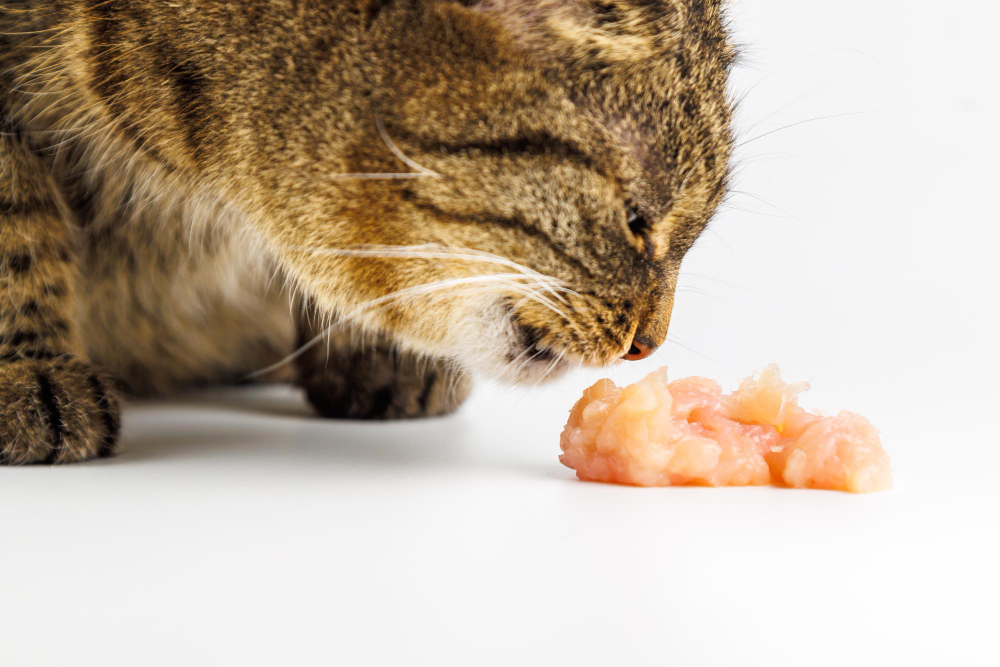The classic image of a cat savoring a fish bone has pervaded our culture, from children’s books to cartoons. But do we really understand the dietary preference of our feline friends? Do they crave fish more than meat? Is a salmon more appealing to them than a chicken? We’re here to dive deep into these burning questions. This article aims to answer questions about cats and fish, their historical ties, current preferences, and whether fish-based cat food is really good or bad for them.
Historical Background: Cats and Fish
How exactly did cats, known to originate from desert areas, start consuming fish? The answer might be as complex as the evolution of cats themselves. Domestic cats trace their lineage back to the Near East, where their wild ancestors probably didn’t have much access to seafood. However, as humans began to settle near bodies of water and later developed trade routes, the diet of domesticated cats diversified. These new environments exposed cats to different types of food, including fish. Over time, cats in coastal areas were likely attracted to human fishing activities, leading to the iconic association of cats and fish.
The Contemporary Cat’s Preference: Fish or Meat?
Now that we’ve scratched the surface of how cats got started eating fish, the question arises: do cats like fish more than chicken or meat? It’s a common belief that cats are attracted to fish, thanks to the strong scent that seems to stimulate their appetite. However, although many cats show a preference for fish, this does not necessarily mean that it is their natural inclination. Instead, it can be influenced by the variety of fish-flavored cat foods available on the market. Researches indicates that cats’ food preferences are largely learned and their early experiences with food can significantly affect their future preferences, this is because cats exhibit lifelong neophilic and neophobic eating behavior. These terms are used to describe the different responses of cats to new foods or dietary changes.
Feeding neophilia refers to the behavior of cats that are curious and open to new foods. These cats show an interest in trying different textures, tastes and smells. They are more likely to accept and adapt to dietary changes, being receptive to new food options. Neophilia mainly comprises the kitten phase of cats, where they are more receptive to dietary changes. When they are adults, the vast majority present neophobic behavior, being averse to new foods or changes in diet. These cats may show resistance or rejection to unfamiliar foods. They may be wary of changes in the texture, taste, or smell of food.
Therefore, if you feed cats foods that contain fish in their composition since they are kittens, it is possible that the food preference for fish is linked to this eating behavior.
The Great Fish Debate: Good or Bad for Cats?
Cats are obligate carnivores, which means they require certain nutrients found only in animal products. Fish can provide many of these nutrients, such as taurine, omega-3 fatty acids and high-quality protein. This seems to suggest that fish is good for cats. However, the question arises, is fish-based cat food bad for cats? Some studies have indicated that a fish-only diet can lead to health problems such as vitamin E deficiency and even mercury poisoning in cats. This is not to say that fish should be completely excluded from a cat’s diet, but moderation is key. Therefore, always seek advice from an animal nutritionist to balance the diet and promote the best for your cat.
DIY Fish for Cats: Precautions and Guidelines
For those who wonder if they can feed their cats fish they catch themselves, the answer is yes, but with some precautions. Not all fish are suitable for food, whether for cats or humans. Some fish may contain high levels of mercury and other toxins depending on where it is being taken from. Therefore, it is essential to be informed about which types of fish are safe and where they come from before feeding them to your cats. In addition, it is recommended to provide cooked fish, as raw fish can contain parasites and harmful bacteria, which can pose significant health risks to cats and their owners.
For the supply of fish as a snack, a maximum of 10% of the calories recommended per day for your cat is recommended, therefore, it is essential to consult an animal nutritionist to know the appropriate recommendation whether for a snack or level of inclusion in a diet complete.
To Cook or Not To Cook: Raw vs Cooked Fish
Given the potential risks associated with raw fish, one might wonder if cats prefer raw or cooked fish. From an owner’s perspective, cooked fish seems like a safer choice. However, some cats might show a preference for raw fish, despite the potential health risks involved. The decision to feed your cat raw or cooked fish should be based on a balance between their preferences and their health.
How Much is Too Much? Fish Intake in a Cat’s Diet
While fish can be a valuable source of nutrients for cats, it shouldn’t make up the entirety of their diet. So how often can cats eat fish? Frequency should ideally depend on factors such as the cat’s age, health status and general diet.
Look for an animal nutritionist to adjust your cat’s diet with the inclusion of fish as a snack or included in the complete diet.
Fish can be a delicious treat for many cats, but it’s crucial not to let them overeat due to potential health risks. Also, keep in mind that while fish does provide certain necessary nutrients, it doesn’t meet all of a cat’s dietary needs. A variety of protein, carbohydrate and fat sources is essential for a balanced diet.
Cats and Fish: A Complex Relationship
In conclusion, the relationship between cats and fish is complex, influenced by the history, human behavior and food preferences of each cat. While some cats prefer fish to other sources of protein, this is not true for all cats. Fish-based cat foods can provide certain nutrients that are beneficial for cats, but the fresh supply can also lead to health problems if not properly regulated and balanced in the diet by a trained professional.
It is crucial to remember that every cat is unique. Your dietary needs and preferences may vary based on many factors including age, race, health status and even your food preference.
Before deciding on your cat’s diet, consider consulting a veterinarian or pet nutritionist. They can provide specific recommendations based on your cat’s unique needs. And when it comes to whether cats really like fish or really hunt fish, the answers can vary wildly.
As cat owners, our job is to provide our feline friends with a balanced diet and ensure their dietary needs are met, to ensure the well-being and longevity of our furry friends.

